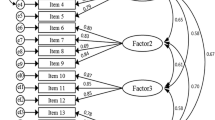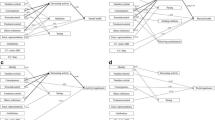Abstract
Although research recognizes the advantages of creating specific content measures, no specific measure of chronic illness-related cognitive fusion had been developed to date. The current study presents the development and validation of the Cognitive Fusion Questionnaire-Chronic Illness (CFQ-CI) in a sample of inflammatory bowel disease (IBD) patients and the analysis of the role of this construct in the psychological health of those patients. Results indicated that the 7-item CFQ-CI was a unidimensional measure of cognitive fusion in patients with chronic illnesses, and that scores had adequate/good internal consistency and construct, convergent, and discriminant validity. This study also showed that chronic illness-related cognitive fusion as assessed by the CFQ-CI acted as a mediator in the association between both IBD-related symptoms and shame with quality of life. The development of the CFQ-CI may thus contribute to a better understanding of the mechanisms influencing functional outcomes in chronic illness.

Similar content being viewed by others
References
Arbuckle, J. L. (2013). Amos 22.0 User's Guide. Chicago: IBM SPSS.
Beacham, A. O., Linfield, K., Kinman, C. R., & Payne-Murphy, J. (2015). The chronic illness acceptance questionnaire: Confirmatory factor analysis and prediction of perceived disability in an online chronic illness support group sample. Journal of Contextual Behavioral Science, 4(2), 96–102. https://doi.org/10.1016/j.jcbs.2015.03.001.
Bond, F. W., Hayes, S. C., Baer, R. A., Carpenter, K. M., Guenole, N., Orcutt, H. K., … Zettle, R. (2011). Preliminary psychometric properties of the Acceptance and Action Questionnaire–II: A revised measure of psychological inflexibility and experiential avoidance. Behavior Therapy, 42, 676–688. https://doi.org/10.1016/j.beth.2011.03.007.
Branstetter, A. D., Wislon, K. G., Hildebrandt, M., & Mutch, D. (2004). Improving psychological adjustment among cancer patients: ACT and CBT. Paper presented at the meeting of the Association for Advancement of Behavior Therapy, New Orleans.
Canavarro, M. C., Serra, A. V., Simoes, M. R., Rijo, D., Pereira, M., Gameiro, S., … Paredes, T. (2009). Development and psychometric properties of the World Health Organization Quality of Life Assessment Instrument (WHOQOL-100) in Portugal. International Journal of Behavioral Medicine, 16(2), 116–124. https://doi.org/10.1007/s12529-008-9024-2.
Cioffi, D., & Holloway, J. (1993). Delayed costs of suppressed pain. Journal of Personality and Social Psychology, 64(2), 274–282. https://doi.org/10.1037/0022-3514.64.2.274.
Clarke, D. M., & Currie, K. C. (2009). Depression, anxiety and their relationship with chronic diseases: A review of the epidemiology, risk and treatment evidence. The Medical Journal of Australia, 190(7 Suppl), S54–S60.
Cohen, J., Cohen, P., West, S. G., & Aiken, L. S. (2003). Applied multiple regression/correlation analysis for the behavioral sciences. Hillsdale: Erlbaum.
Dinis, A., Pinto-Gouveia, J., Duarte, C., & Castro, T. (2011). Estudo de validação da versão portuguesa da Escala de Respostas Ruminativas [Study of the Portuguese validation of the Ruminative Responses Scale]. Psychologica, 54, 175–202.
Duarte, C., Pinto-Gouveia, J., Ferreira, C., & Silva, B. (2016). Caught in the struggle with food craving: Development and validation of a new cognitive fusion measure. Appetite. https://doi.org/10.1016/j.appet.2016.03.004.
Ferreira, C., Trindade, I. A., Duarte, C., & Pinto-Gouveia, J. (2014). Getting entangled with body image: Development and validation of a new measure. Psychology and Psychotherapy: Theory, Research and Practice. https://doi.org/10.1111/papt.12047.
Ferreira, N. B., Eugenicos, M. P., Morris, P. G., & Gillanders, D. T. (2013). Measuring acceptance in irritable bowel syndrome: Preliminary validation of an adapted scale and construct utility. Quality of Life Research, 22(7), 1761–1766. https://doi.org/10.1007/s11136-012-0299-z.
Gerteis, J., Izrael, D., Deitz, D., LeRoy, L., Ricciardi, R., Miller, T., & Basu, J. (2014). Multiple chronic conditions chartbook (AHRQ Publications No. Q14-0038). Rockville, MD: Agency for Healthcare Research and Quality.
Gillanders, D. T., Bolderston, H., Bond, F. W., Dempster, M., Flaxman, P. E., Campbell, L., … Remington, B. (2014). The development and initial validation of the Cognitive Fusion Questionnaire. Behavior Therapy, 45(1), 83–101. https://doi.org/10.1016/j.beth.2013.09.001.
Graff, L. A., Walker, J. R., Lix, L., Clara, I., Rawsthorne, P., Rogala, L., … Bernstein, C. N. (2006). The relationship of inflammatory bowel disease type and activity to psychological functioning and quality of life. Clinical Gastroenterology and Hepatology: The Official Clinical Practice Journal of the American Gastroenterological Association, 4(12), 1491–1501. https://doi.org/10.1016/j.cgh.2006.09.027.
Gregg, J. A., Callaghan, G. M., Hayes, S. C., & Glenn-Lawson, J. L. (2007). Improving diabetes self-management through acceptance, mindfulness, and values: A randomized controlled trial. Journal of Consulting and Clinical Psychology, 75(2), 336–343. https://doi.org/10.1037/0022-006X.75.2.336.
Hadlandsmyth, K., White, K. S., Nesin, A. E., & Greco, L. A. (2013). Proposing an Acceptance and Commitment Therapy intervention to promote improved diabetes management in adolescents: A treatment conceptualization. International Journal of Behavioral Consultation and Therapy, 7(4), 12–15. https://doi.org/10.1037/h0100960.
Hayes, S. C., Luoma, J. B., Bond, F., Masuda, A., & Lillis, J. (2006). Acceptance and commitment therapy: Model, processes and outcomes. Behaviour Research and Therapy, 44, 1–25. https://doi.org/10.1016/j.brat.2005.06.006.
Hayes, S. C., Strosahl, K. D., & Wilson, K. G. (2012). Acceptance and commitment therapy: The process and practice of mindful change (2nd ed.). New York: Guilford Press.
Hu, L., & Bentler, P. M. (1999). Cutoff criteria for fit indexes in covariance structure analysis: Conventional criteria versus new alternatives. Structural Equation Modeling: A Multidisciplinary Journal, 6(1), 1–55. https://doi.org/10.1080/10705519909540118.
IBM Corp. (2013). IBM SPSS Statistics for Windows, Version 22.0 [computer software]. Armonk, NY: IBM Corp.
Kline, R. B. (2005). Principles and practice of structural equation modeling (2nd ed.). New York: Guilford Press.
Levenstein, S. (2004). Embracing complexity: What determines quality of life in inflammatory bowel disease? European Journal of Gastroenterology & Hepatology, 16(12), 1253–1255. https://doi.org/10.1097/00042737-200412000-00002.
Lundgren, T., Dahl, J., & Hayes, S. C. (2008). Evaluation of mediators of change in the treatment of epilepsy with acceptance and commitment therapy. Journal of Behavioral Medicine, 31(3), 225–235.
Lundgren, T., Dahl, J., Melin, L., & Kies, B. (2006). Evaluation of acceptance and commitment therapy for drug refractory epilepsy: A randomized controlled trial in South Africa - A pilot study. Epilepsia, 47(12), 2173–2179. https://doi.org/10.1111/j.1528-1167.2006.00892.x.
Marôco, J. (2010) Análise de Equações Estruturais: Fundamentos teóricos, software e aplicações [Analysis of structural equations: Theoretical foundations, software and applications]. Pero Pinheiro: Report Number.
McCracken, L. (2011). History context and new developments in behavioral medicine. In L. McCracken (Ed.), Mindfulness and acceptance in behavioral medicine: Current theory and practice (pp. 3–30). Oakland, CA: New Harbinger.
McCracken, L. M., Vowles, K. E., & Eccleston, C. (2004). Acceptance of chronic pain: Component analysis and a revised assessment method. Pain, 107(1), 159–166. https://doi.org/10.1016/j.pain.2003.10.012.
Pinto-Gouveia, J., Dinis, A., Gregório, S., & Pinto, A. (2014). The Preliminary psychometric properties of the portuguese version of the cognitive fusion questionnaire (manuscript in preparation).
Pinto-Gouveia, J., Gregório, S., Dinis, A., & Xavier, A. (2012). Experiential avoidance in clinical and nonclinical samples. International Journal of Psychology and Psychological Therapy, 12(2), 139–156.
Reynolds, C. R., & Suzuki, L. (2013). Bias in psychological assessment: An empirical review and recommendations. In J. R. Graham, J. A. Naglieri, & I. B. Weiner (Eds.), Handbook of psychology (Vol. 10). Assessment psychology (2nd ed., pp. 82–113). Hoboken, NJ: Wiley.
Ruiz, F. J. (2010). A review of acceptance and commitment therapy (ACT) empirical evidence: Correlational, experimental psychopathology, component and outcome studies. International Journal of Psychology and Psychological Therapy, 10(1), 125–162. https://doi.org/10.1080/028457199439937.
Schumacker, R. E., & Lomax, R. G. (2004). A beginner’s guide to structural equation modeling (2nd ed.). Mahwah, NJ: Lawrence Erlbaum Associates.
Segal, Z. V., Williams, J. M. G., & Teasdale, J. D. (2002). Mindfulness-based cognitive therapy for depression: A new approach to preventing relapse. New York: Guilford Press.
Tabachnick, B., & Fidell, L. (2013). Using multivariate statistics (6th ed.). Boston: Pearson.
The WHOQOL Group. (1998). The World Health Organization Quality of Life Assessment (WHOQOL): Development and general psychometric properties. Social Science & Medicine, 46, 1569–1585. https://doi.org/10.1016/S0277-9536(98)00009-4.
Treynor, W., Gonzalez, R., & Nolen-Hoeksema, S. (2003). Rumination reconsidered: A psychometric analysis. Cognitive Therapy and Research, 27(3), 247–259. https://doi.org/10.1023/A:1023910315561.
Trindade, I. A., Ferreira, C., & Pinto-Gouveia, J. (2015a). Inflammatory bowel disease: The harmful mechanism of experiential avoidance for patients’ quality of life. Journal of Health Psychology. https://doi.org/10.1177/1359105315587142.
Trindade, I. A., Ferreira, C., & Pinto-Gouveia, J. (2015b). Ulcerative colitis symptomatology and depression: The exacerbator role of maladaptive psychological processes. Digestive Diseases and Sciences, 60(12), 3756–3763. https://doi.org/10.1007/s10620-015-3786-6.
Trindade, I. A., Ferreira, C., & Pinto-Gouveia, J. (2017a). Chronic illness-related shame: Development of a new scale and novel approach for IBD patients’ depressive symptomatology. Clinical Psychology and Psychotherapy, 24(1), 255–263. https://doi.org/10.1002/cpp.2035.
Trindade, I. A., Ferreira, C., & Pinto-Gouveia, J. (2017b). Shame and emotion regulation in inflammatory bowel disease: Effects on psychosocial functioning. Journal of Health Psychology. https://doi.org/10.1177/1359105317718925.
Trindade, I. A., Ferreira, C., Pinto-Gouveia, J., & Nooren, L. (2016). Clarity of personal values and committed action: Development of a shorter Engaged Living Scale. Journal of Psychopathology and Behavior Assesment. https://doi.org/10.1007/s10862-015-9509-7.
Trompetter, H. R., ten Klooster, P. M., Schreurs, K. M. G., Fledderus, M., Westerhof, G. J., & Bohlmeijer, E. T. (2013). Measuring values and committed action with the Engaged Living Scale (ELS): Psychometric evaluation in a nonclinical and chronic pain sample. Psychological Assessment, 25(4), 1235–1246. https://doi.org/10.1037/a0033813.
Vlaeyen, J. W., & Linton, S. J. (2000). Fear-avoidance and its consequences in chronic musculoskeletal pain: A state of the art. Pain, 85(3), 317–332. https://doi.org/10.1016/s0304-3959(99)00242-0.
Vowles, K. E., & McCracken, L. M. (2008). Acceptance and values-based action in chronic pain: A study of treatment effectiveness and process. Journal of Consulting and Clinical Psychology, 76(3), 397–407. https://doi.org/10.1037/0022-006x.76.3.397.
Ward, B. W., Schiller, J. S., & Goodman, R. A. (2014). Multiple chronic conditions among US adults: A 2012 update. Preventing Chronic Disease, 11, E62. https://doi.org/10.5888/pcd11.130389.
Watkins, E. R. (2009). Depressive rumination and co-morbidity: Evidence for brooding as a transdiagnostic process. Journal of Rational-Emotive and Cognitive-Behavior Therapy, 27(3), 160–175. https://doi.org/10.1007/s10942-009-0098-9.
Acknowledgements
We are grateful for the help provided by the Portuguese Association for IBD (Associação Portuguesa para a Doença Inflamatória do Intestino; APDI) during the recruitment process of the current research project. We would also like to thank the Editor and Reviewers of this manuscript for their input and help in improving the manuscript.
Funding
This research has been supported by the first author (Inês A. Trindade), PhD Grant (SFRH/BD/101906/2014) sponsored by FCT (Portuguese Foundation for Science and Technology).
Author information
Authors and Affiliations
Corresponding author
Ethics declarations
Conflict of interest
Inês A. Trindade, Cláudia Ferreira, and José Pinto-Gouveia declare that they have no conflict of interest.
Human and Animal Rights
All procedures were in accordance with the ethical standards of the institutional research committees and with the 1964 Helsinki declaration and its later amendments or comparable ethical standards.
Informed Consent
Informed consent was obtained from all individual participants included in the study.
Appendix 1: Portuguese Version of the CFQ-CI
Appendix 1: Portuguese Version of the CFQ-CI
CFQ-CI
Instruções: Em baixo, encontrará uma lista de afirmações. Por favor, classifique o quanto é verdadeira para si cada afirmação, rodeando para esse efeito um dos números que se encontra em frente a cada frase. Responda, por favor, a cada frase, usando a seguinte escala.

Rights and permissions
About this article
Cite this article
Trindade, I.A., Ferreira, C. & Pinto-Gouveia, J. Assessment of Chronic Illness-Related Cognitive Fusion: Preliminary Development and Validation of a New Scale with an IBD Sample. J Clin Psychol Med Settings 25, 356–366 (2018). https://doi.org/10.1007/s10880-017-9536-5
Published:
Issue Date:
DOI: https://doi.org/10.1007/s10880-017-9536-5




